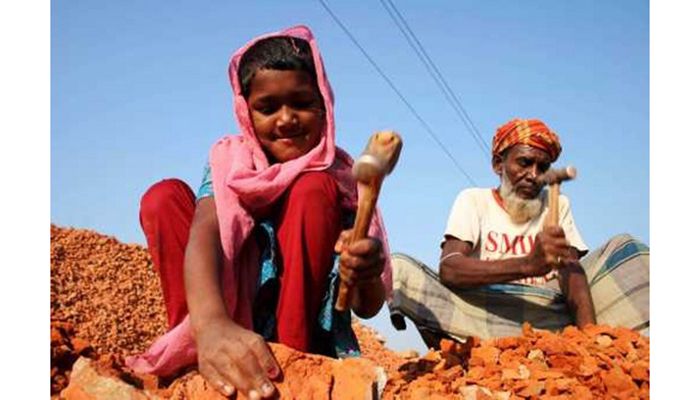
Desk Report
Publish: 02 Mar 2021, 06:19 pm

After the separation of his parents, minor boy Robiul who just crossed 10 years, had to start work with his mother and elder brother at a dried fish processing village in Cox’s Bazar area.
This misfortune has forced him and his elder brother Amit, 12, to stop going to school. The helpless brothers started working at the Najirartek dry fish processing village of the district.
''After the separation of my parents, my mother made all sorts of efforts to bear the expenses for our livelihood and education. But all her efforts failed. At last, she joined a dried fish processing unit in the village. But her income was not enough for maintaining our three-member family,'' said Robiul, who is from Moheskhali Upazila under the district.
He said they had no alternative-so they stopped going to school and started working as a labourer.
''Now, my elder brother, my mother and I work in the dried fish processing unit from 7:00 am to 6:00 pm every day. My mother earns Tk 300 to Tk 350 daily. But, I am working on the contract of Tk 17,000 for six- month while my elder brother is working on contact of Tk 50,000 for one year,'' Robiul said with tearful eyes.
The boy further said he and his brother were facing different health-related problems for working in the processing unit. ''We have to work in the unit from early morning to evening. Moreover, we cannot sleep at night smoothly due to pain in the hands. Sometimes, my brother and I go to the doctor for medicine, but most of the time, we can’t take proper treatment due to lack of money,'' he added.
Another minor Md Riaz Uddin, 12, is also working at another dried fish processing unit at Najirartek village. He had to take the burden of his six-member family on his tiny shoulder as his father's income was not enough for bearing all the family expenses.
Like Kaiser and Riaz, many children drop out from schools, for their involvement at the dried fish sector in the country, although there is no latest data about the number of child labourers working in the dried fish sector.
Experts informed that the child workers in the dried fish sector are facing different health-related risks and are deprived of education due to poverty.
With a view to eliminating hazardous child labour, the government has already announced some 38 sectors as hazardous for children considering professional health and safety issues.
Talking to BSS, labour and employment secretary KM Abdus Salam said the government is making its best efforts to eliminate hazardous child labour from the country to ensure the rights of children to build a healthy nation.
He informed that they have a plan to expand the hazardous list as per the decision of the Tripartite Consultancy Committee meeting.
Inspector general (in charge) of the Department of Inspection for Factories and Establishments Md Ejaz Ahmed Jaber said the government was planning to expand the hazardous list.
''Now, there are 38 hazardous sectors. As per the plan, we have already selected two more hazardous sectors-cold storage and pharmaceutical. We have a plan to include six more sectors, including child labour in the dried fish sector, as hazardous for children,'' he added.
Civic Engagement and Capacity Development Specialist of the CLIMB project Md Tanvir Sharif said that despite many successes of the government and national and international organisations in various labour-intensive sectors, child labour in DFS still required more attention as it was one of the worst forms of child labour.
''Children working in this sector are exposed to hazardous chemicals, saline water for hours and work in adverse working condition. They work more than nine hours in a hazardous environment without any protective gear. And as such experience skin diseases and respiratory problems. More importantly, the children have less attendance in schools,'' he added.
Referring to a study, he informed that the study estimates 14,366 workers in the DFS of which 63 per cent are adult female, 17 per cent are adult male and 20 per cent are children. 72 per cent of the child workers in the DFS are girl, he added.
He said most of the children are aged 14-17 (59 per cent) but a substantial portion is under 14 (41 per cent).
Among the child workers, he said, 72 per cent is a daily basis and the rest is contractual.
Subscribe Shampratik Deshkal Youtube Channel
© 2024 Shampratik Deshkal All Rights Reserved. Design & Developed By Root Soft Bangladesh